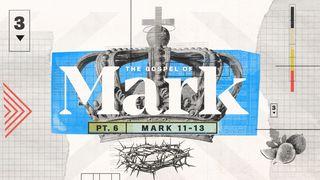Nahum Explained | Judgement FallsSample

Day 1 | Nahum 1
This devotional works best as an audio experience. Hit the play button now, and read along if you like.
Welcome to the Book of Nahum on Through the Word! Pastor Jonathan here, and today, we jump into a book that I bet a different prophet had wished he could have written! Jonah, I’m talking about you!
For over two hundred years, the city of Nineveh had been a plague across the Middle East. The capital of the Neo-Assyrian Empire, Nineveh and her kings dominated the region from modern Iran to Egypt, from Turkey to the Arabian Peninsula. Nineveh was an impenetrable fortress, her walls were miles in circumference, and wide enough to host chariot races. 1500 towers lined the walls, each 18 stories tall. The city was built on the bank of the Tigris river, with the tributary Khoser River flowing through the center of the city.
Jonah had prophesied against Nineveh, and the city had repented of their sins. Jonah had prophesied during a time of weakness in the Assyrian Empire, and during that moment of upheaval, the nation turned to the Lord for a time. Now 120 years later, Nineveh is experiencing a revival, not of hearts, but of power. Ashurbanipal, king of Assyria, has returned victorious from a major campaign against Egypt. On his return home, he defeated Manasseh, king of Judah, and deported him. But he left the city standing. Having defeated the great powers of the region, Ashurbanipal ruled unchecked.
It is during the reign of this great and powerful king that Nahum is sent to proclaim the destruction of Nineveh and the rest of Assyria. No doubt the prophet’s message made him very popular among the Jews, but would have made him a very public enemy of Assyria. Let’s jump in at verse 2:
"The Lord is a jealous and avenging God;
the Lord takes vengeance and is filled with wrath.
The Lord takes vengeance on his foes
and vents his wrath against his enemies.
The Lord is slow to anger but great in power;
the Lord will not leave the guilty unpunished" (Nahum 1:2-3).
Now, the Lord had used Assyria to punish Israel for her sins, but they had gone too far in their cruelty, and would be punished. God’s wrath and jealousy have been awakened. Assyria had ravaged the land of Israel, and had despised the name of the Lord. The Lord may be slow to anger - a reference to the message in Jonah 4 - but he would punish Nineveh for their sins. Wicked nations throughout existence have misinterpreted God’s patience as a sign of approval, but God waits and warns, and then brings justice and judgement. Verse 7:
"The Lord is good,
a refuge in times of trouble.
He cares for those who trust in him,
but with an overwhelming flood
he will make an end of Nineveh;
he will pursue his foes into the realm of darkness" (Nahum 1:7-8).
Assyria had rolled over the land of Israel and Judah like a flood, and they continued to do so wherever they marched. But Nahum sees in his vision a different flood, one that would destroy Nineveh. The river that was the city’s source of life and protection would soon be its downfall.
"Whatever they plot against the Lord
he will bring to an end;
trouble will not come a second time.
They will be entangled among thorns
and drunk from their wine;
they will be consumed like dry stubble" (Nahum 1:9-10).
Assyria had attacked Judah before, but the Lord promises that they would not be a source of trouble anymore. Assyria may plot against Jerusalem and against the Lord, but any attempt to conquer them would result in Assyria being caught in their own traps. Verse 12:
“This is what the Lord says:
‘Although they have allies and are numerous,
they will be destroyed and pass away.
Although I have afflicted you, Judah,
I will afflict you no more.
Now I will break their yoke from your neck
and tear your shackles away’” (Nahum 1:12-13).
Nineveh’s army was immense, but they would be cut down. Judah had been punished, but soon would be set free from bondage to Assyria. Judah had been ravaged by the kings of Assyria as a chastisement from the Lord, but the Lord had declared, enough. The days of Nineveh were numbered, even if they were at the peak of power. Look at verse 14:
“The Lord has given a command concerning you, Nineveh:
‘You will have no descendants to bear your name.
I will destroy the images and idols
that are in the temple of your gods.
I will prepare your grave,
for you are vile’” (Nahum 1:14).
Nineveh’s destruction was coming soon, the king would have no descendants to bear his name. Ashurbanipal’s sons had already been born, and two of them would rule for a short time, but the destruction would be complete, and the line of Ashurbanipal would be utterly cut off.
Many people had groveled at the feet of the Assyrian kings, praising them for their might and power. But to the Lord, they were vile men, and would go down to the grave soon. But Jerusalem? Well, look at verse 15:
“Look, there on the mountains,
the feet of one who brings good news,
who proclaims peace!
Celebrate your festivals, Judah,
and fulfill your vows.
No more will the wicked invade you;
they will be completely destroyed” (Nahum 1:15).
Nahum tells the people of Judah: prepare to return to Jerusalem, celebrate the annual festivals, worship in the temple. The wickedness of Assyria would not return, the threat is gone forever.
Second Kings 22 and 23 tells us the story of what happened in Jerusalem at this time. Josiah had taken the throne from his father at the age of eight years old. In the early years of his reign, he began to follow the Lord. He restored the worship of Yahweh at the temple, destroying the pagan gods of his father Amon and grandfather Manasseh. He re-instituted the celebration of Passover. And 2 Kings 23 says:
“Neither in the days of the judges who lead Israel nor in the days of the kings of Israel and the kings of Judah had any such Passover been observed” (2 Kings 23:22).
God had spared Judah, and Josiah lead his people in celebrating God’s victory on their behalf. But Nahum is not done with his vision against Nineveh. Join us tomorrow as we continue on Through the Word.
Read Nahum 1
All verses are quoted from the NIV unless otherwise noted.
Scripture
About this Plan

When the Bible is confusing, Through the Word explains it - with clear and concise audio guides for every chapter. Here in the book of Nahum, the city of Nineveh has returned to wickedness. 120 years earlier, the Ninevites repented at the warnings of Jonah, but the change didn’t last. Jonathan Ferguson guides us through Nahum’s prophecy, and reminds us that God’s patience should not be mistaken for God’s approval.
More









